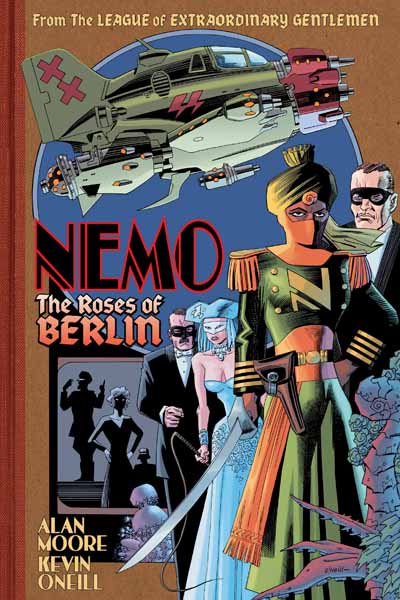This is the second volume following Janni, the second Captain
Nemo, a sequel to the (superior) first volume, Heart of Ice.
Moore introduced the character in a particularly brutal storyline in
the first chapter of The League of Extraordinary
Gentlemen's third chapter,
Century. I am a huge
admirer of Moore's work, and Janni Nemo is one of his finest
characters; a powerfully strong woman who has overcome great cruelty
and patriarchy to become her own agent in the world, freer than
almost any other character in the book. Century: 1910 and
Heart of Ice were both
excellent. So it's disappointing that Roses of Berlin is
merely fairly good.

After the denser, more complex previous volumes, Roses of Berlin comes across as lightweight in Metropolis. In this version of history, it is Adenoid Hynkel, The Great Dictator himself, who rules a unified Germany-Pomerania, with assistance from such minds as Karl Rotwang, Dr. Caligari and Dr. Mabuse, but the reveal of the true power behind all this is still hugely effective.
comparison. The story is very linear; not in itself a bad thing, but one that leaves it making less of an impression than others. It's a straightforward vendetta story, rather more interesting than most for being between two powerful female characters, one of whom is gloriously flawed yet majestic, the other, so far gone as to be basically inhuman. Yet, it is still straightforward. As always, Moore provides an entertaining mishmash of various fictional properties to create an alarming alternative history. Nemo and her husband, Broad Arrow Jack, enter the Berlin of Fritz Lang's
Yet there's not a great deal more to this than an adventure peppered with amusing references. That, in itself, is enough to make a fine comic book, particularly when supported by Kevin O'Niell's remarkable artwork. Yet it's less than what I've come to expect from Moore, and this series. It's a short read for those who don't read German. Moore has used foreign, and sometimes wholly fictional, languages to great effect in the past, adding verisimilitude to the work, but here it simply makes several pages impenetrable. As always, Jess Nevins is on hand to provide annotations, but such helpful supplementary material should not be essential to enjoy the work. As was the case with the earlier League volumes, the prose segment at the end provides some of the most enjoyable material, but it does not add much to the proceedings. By industry standards, this is a fine comic book, but by Moore's, it's less than expected. Moore states that there is one more standalone volume to come, followed by the fourth volume of League proper. However, I wonder if he really has much more to say with the series.

After the denser, more complex previous volumes, Roses of Berlin comes across as lightweight in Metropolis. In this version of history, it is Adenoid Hynkel, The Great Dictator himself, who rules a unified Germany-Pomerania, with assistance from such minds as Karl Rotwang, Dr. Caligari and Dr. Mabuse, but the reveal of the true power behind all this is still hugely effective.
comparison. The story is very linear; not in itself a bad thing, but one that leaves it making less of an impression than others. It's a straightforward vendetta story, rather more interesting than most for being between two powerful female characters, one of whom is gloriously flawed yet majestic, the other, so far gone as to be basically inhuman. Yet, it is still straightforward. As always, Moore provides an entertaining mishmash of various fictional properties to create an alarming alternative history. Nemo and her husband, Broad Arrow Jack, enter the Berlin of Fritz Lang's
Yet there's not a great deal more to this than an adventure peppered with amusing references. That, in itself, is enough to make a fine comic book, particularly when supported by Kevin O'Niell's remarkable artwork. Yet it's less than what I've come to expect from Moore, and this series. It's a short read for those who don't read German. Moore has used foreign, and sometimes wholly fictional, languages to great effect in the past, adding verisimilitude to the work, but here it simply makes several pages impenetrable. As always, Jess Nevins is on hand to provide annotations, but such helpful supplementary material should not be essential to enjoy the work. As was the case with the earlier League volumes, the prose segment at the end provides some of the most enjoyable material, but it does not add much to the proceedings. By industry standards, this is a fine comic book, but by Moore's, it's less than expected. Moore states that there is one more standalone volume to come, followed by the fourth volume of League proper. However, I wonder if he really has much more to say with the series.
No comments:
Post a Comment